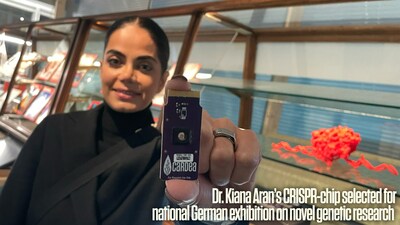"It's not very common for scientists or academics to have their technology featured in a museum, so to see my technology being showcased next to Watson and Crick's DNA model is a proud moment in my career and I'm very happy to be a part of this exhibition" reacts Dr. Kiana Aran, Chief Scientific Officer of Cardea Bio, to being selected for the exhibition.
Watch the entire interview with Dr. Kiana Aran and Dr. Viktoria Krason here.
Curator & project manager at the Deutsches Hygiene-Museum in Dresden [DHMD], Dr. Viktoria Krason, states, "The overall motivation for this exhibition was to provide an updated picture of genetics in society right now. Because of new developments in technologies within genome editing and sequencing, it's our impression that genetics is now manifesting itself in social debates and media. Specifically, for the 'health' section of the exhibition, we were very interested in the development that CRISPR-cas9 can not only be used for gene editing, but also as a search engine to look for specific sequences in genes."
Dr. Aran continues, "The way that we detect genetic diseases today, is a long process that requires a lot of specialized medical and lab equipment, so it takes days. The CRISPR-chip is an example of a new technology that overcomes those limitations, because the CRISPR-chip can do genotyping in a matter of minutes! And because it's based on semiconductor principles it's very scalable, cheap, and can be used anywhere in the world. This is how we can democratize global access to powerful inventions like genotyping or genetic disease testing."
About the 'Of Genes and Human Beings' exhibition
The exhibition 'Of Genes and Human Beings' takes a serious and consistent look at the insights gained in science laboratories from the perspective of the social and cultural sciences: with exhibits from everyday life and science, culture and history, the approaches of contemporary art – and with interactive stations that invite us to find out for ourselves who we are and who we might become.
The exhibition 'Of Genes and Human Beings' runs through Sep 10, 2023, at the Deutsches Hygiene-Museum in Dresden, Germany. Read more here.
The Internet of Biology
In biological science, the 20th century focused on simple tests such as ELISA or lateral flow assays. After the human genome was sequenced and genomics had a major breakthrough in the first 20 years of the 21st century, we're now facing the next wave of innovation in and around biology: The opportunity to understand and communicate with the immense information density available to us in biology. The embrace of complex, real-time data, available via convenient and compact electronic devices, and converted into human understandable information via cloud computing can be conceived of as "
the internet of biology".
The principals behind internet of biology is paving the way to facilitate global access to powerful technologies – like the CRISPR-chip - to the benefit of everyone, everywhere on our planet. The way that we detect genetic diseases today, is a long process that requires a lot of instrumentation and it takes days. The CRISPR-chip is an example of a new technology that overcomes those limitations, because the CRISPR-chip is able to do genotyping in a matter of minutes! And because it's based on electronic technologies it's very scalable, cheap, and can be used anywhere in the world. This can democratize global access to powerful inventions like genotyping or genetic disease testing.
About Cardea Bio
Cardea Bio is the world's first mass producer of a biocompatible semiconductor, the
BPU™ (Biosignal Processing Unit) Platform. The BPU is the first and only graphene semiconductor capable of translating real-time streams of biology's multiomics signals into digital information. Through the BPU™ platform, Cardea's long-term vision is to democratize access to the biosignals and insights behind the most advanced technology on our planet: Nature and biology. The
Internet of Biology is that way becoming possible.
Cardea is headquartered in San Diego and has additional activity in Los Angeles. Cardea has developed and built the graphene-based biocompatible semiconductor BPU biosensor platform for applications across a variety of sectors including human health, agriculture, molecular diagnostics, biotechnology, environmental monitoring, and animal health.
Contact Cardea
Lasse Görlitz, VP of Communications
US phone: +1 858 319 7135
EU phone: +45 2758 2601
Email Contact
![]() View original content to download multimedia:
https://www.prnewswire.com/news-releases/dr-kiana-arans-crispr-chip-selected-for-national-german-exhibition-on-novel-genetic-research-301801145.html
View original content to download multimedia:
https://www.prnewswire.com/news-releases/dr-kiana-arans-crispr-chip-selected-for-national-german-exhibition-on-novel-genetic-research-301801145.html
SOURCE Cardea Bio
| Contact: |
| Company Name: Cardea Bio
|










